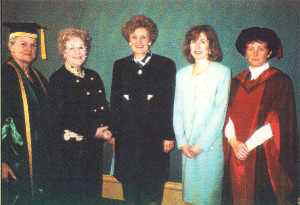|
In Greek mythology, when Odysseus sailed to
Troy to join in the Greek assault on that city in the famous
story of the Trojan horse, which he invented, he left his wife
and family at home in Greece, and he left a good and trusted
friend in charge of the household, and particularly to help
guide and advise his son Telemachus, as he would be gone a
very long time. When the goddess Athena appeared to Odysseus
in his travels, she often assumed the form of this wise and
trusted advisor - Mentor.
The word "mentor" has come to be used to describe a wise and
trusted advisor, and it is through "mentoring" that men have
traditionally climbed the ladder of success.
Whether it is done on a formal or informal basis,
mentoring basically involves a more experienced person helping to
facilitate the development of a less experienced employee, and
women who plan to make it to the top of any organization or career
would do well to cultivate the guidance and sponsorship of a
mentor.
At a recent conference I attended, these were
listed as things one needs and to some extent can expect from a
mentor in the climb up that ladder (Myrtle Beach Emerging Issues
Conference October 2002)
| Vision |
| Goal
Clarifying |
| Supportiveness |
| Confidence
Building |
| Consideration |
| Patience |
| Trust
Building |
| Openness |
|
 |
A mentor could help you with vision and goal clarifying
by sitting you down for a talk about what you really want
to do with your life, and with openness and supportiveness
and confidence building by taking you to lunch and gently
telling you how even though you blew it at the last staff
meeting, there were things that you did well.
The mentor helps the protégé achieve goals through
| Teaching |
| Guidance |
| Counseling |
| Intervention |
| Sponsorship |
 |
Exercise
Mentor Roles |
Describe
specifically how a mentor might help you in one of these above four
roles. (e.g.: how might a mentor help teach you
something useful in your job?)
Post your answer in
the
Moodle
Discussion Group. |
|
Read the case "Haywood Securities: The Mentor"
|
Haywood Securities:
The
Mentor
© M Louise Ripley
Haywood Securities
was a small investment advisory firm in Calgary, founded in
the 1960’s. They now employ a dozen people, eight men in the
actual business of stock trading, and four women, all in
staff positions. They have never had a good record on
affirmative action, but, perhaps surprisingly, the one
person in the company to recognize the need to promote
capable women was Charles Haywood, who had recently retired,
leaving his son, Jack Haywood, to run the business.
Laurie
Sullivan had worked for Charles Haywood for a number of
years as his secretary, and at his urging had returned to
school and completed her M. B.A. and her securities license
and was now serving as his Executive Assistant. As Charles
spent less and less time in the office, Laurie had taken
over most of his work of meeting with old and valued
clients.
When he was
ready to retire, Charles, knowing how eager his son was to
take over the family business, said he would only go if Jack
promoted Laurie to the rank of Financial Analyst and taught
her the finer points of client management that he had taught
Jack. Jack grudgingly appointed her, his desire to be
President of the firm outweighing his resentment at having
to promote and work with a woman.
Laurie
felt Jack’s indignation, and their sessions strained them
both. He was ten years older than she, but a far greater
distance than age separated them. She respected him and
coveted his financial talents, but she also stood in utter
awe of him. It was not the Haywood family name and their
wealth that daunted her, because she experienced the problem
only with Jack, never with his father. Laurie was now in her
thirties, and, by almost anyone’s consideration, grown up,
equally at ease handling emotionally overwrought clients,
officious government representatives, or bond traders of
delicate temper, but Jack somehow always managed to make her
feel incompetent. She had no explanation for this; she knew
he believed women to have no place in the world of finance,
and she knew he resented her. If there were something more,
she could not name it. She worked hard to convince him she
was a serious apprentice, and he came, rather grudgingly, to
acknowledge her skills and talents and even on rare
occasions to praise her work.
Laurie’s
greater problem was with the other employees, both male and
female. The male stock and bond traders refused to accept
her authority, regularly calling or emailing Jack to
double-check on anything she asked of them, while the women
assumed she had only been promoted because she was sleeping
with Jack. Laurie decided to talk to her partner Pat about
it, one night at dinner.
|
Laurie: I don’t know what the problem is, Pat; none of
the men seems to believe I can do the work, yet I’ve
been doing most of it for years, side by side with
them.
Pat:
But I thought you got along so well with them?
Laurie: I did, as long as I was Charles’ secretary.
Even when I got my degree, and my securities license,
as long as I was working as Charles’ assistant, they
were more than glad even to out of their way to help
me. But now that he’s gone and I’m working with Jack,
I can’t get them to even say a decent ‘good-morning’
any more.
Pat:
Well, what about the women? You were always good
friends with them, weren’t you?
Laurie: Sure, again, as long as I was, and here she
made quotation marks in the air, “just a secretary.”
Now that I’m Associate V.P. and working along side
Jack, the word in the rumour mill is that I only got
the position because I’m sleeping with him. At this,
Pat’s head went back with a raucous laugh.
Pat:
Ha! If only they knew how unlikely that was! Can you
talk to him? Can he help at all in this?
Laurie: I don’t know, Pat, I just don’t know.
Pat: Do you think you’d have these same problems if
your name were Leonard instead of Laurie?
Laurie:
That much I do know; I’m
sure I wouldn't. But that’s not going to change, is it?
|
This case study builds on an idea from
Barbara Lyons' "General Computer" in Karsten, Foegen
Margaret (1994) Management and Gender: Issues and
Attitudes. Westport, Connecticut: Praeger.
|
 |
Exercise
Socialization |
FOR THE
UNIT ON SOCIALIZATION: Thinking about the roles and
relationships in this story: how did things get to be this
way in this office?
Post your answer in the
Moodle
Discussion Group. |
|
 |
Exercise
Intervention |
FOR THE
UNIT ON LEADERSHIP/TOPIC OF MENTORS: How specifically in the role of
intervention might Charles have served as a mentor
to Laurie? As the manager who supervised her, how might he
have helped improve things?
Post your answer in the
Moodle
Discussion Group. |
|
Help from a mentor up the corporate ladder typically
happens in four stages
| Leveling the playing field |
| Creating
acceptance and safety |
| Sharing advice, feedback, support |
| Pay-off stage: independence |
|

|
While proximity helps, in that the mentor is nearby and can be
called on easily, one does not have to be geographically close in
order to be a mentor. A few years ago, through an organization of
academic women to which I belonged, I served as a mentor over a
period of several years to a woman who was just starting her job
as an Assistant Professor in a business school in a university in
Indiana in the United States. We never met, corresponded only by
email, but I was able to be of assistance to her in her fight for
tenure, particularly because I was NOT close, not involved at all
in the formal procedure, and was someone to whom she could turn
for advice (having gone through it recently myself) and
particularly for the answers to what might have appeared to her
colleagues (who sat in judgment of her for the tenure process) as
"stupid" questions. I was very happy to see her finally achieve
her goal.
Men more typically see mentoring as
task-oriented while women more typically see it as
friendship-based. Feminist theory is taking mentoring to a new stage of learning
collaboration, peer sharing, equality, respect, safety, trust,
where the mentoring can be done in a web style rather than
hierarchical (peers with different levels of experience versus
Vice President/trainee). This is also happening because of the
phenomenon of younger employees often being much more experienced
and sophisticated in areas such as computers where an older
employee may need help getting up to speed.
 |
A mentor can be tremendously helpful in
career planning, a process that starts with the important
step of getting to know yourself.
|
| Method |
Verbiage |
Action |
Philosophy |
| Wait for one to ask
you |
"How about those
Jays, eh?" |
Look around, maybe
someone's left an old one lying about somewhere |
"All things come
to those who wait" |
| Ask Directly |
"Yo! You! How
about being my mentor?" |
Accost in elevator or
executive washroom |
"Boldly is the
only way to go"*
*John Furtado's Star Trek Rules
for Business |
| Ask Indirectly |
"Could I ask
your advice on a project I'm working on?" |
Pop into office for
two
minutes |
"Nothing
ventured, nothing gained" |
| Volunteer |
"I hear you need
volunteers for the symphony fund-raising
project." |
By appointment, in
office, by email, before meeting |
"Mi casa es su
casa" |
| Sneak up on one |
(silence) |
Watch from afar,
learn, don't let on you're there |
"Great White
Hunter" |
|
The Government of Canada, recognizing the need we will
have soon for workers to replace the retiring Baby Boomers, has had a web
site under the auspices of Canadian Information and Networking Services.
The link is no longer active but it was to provide "mentoring, resources and forums that assist skilled,
experienced, and expert professionals, business and trades people who are
new to Canada, or are considering immigrating to Canada."
|
 |
Exercise
Canadainfonet |
How
would such a site be valuable to a current manager? To a
current worker?
Post your answer in the
Moodle
Discussion Group. |
|

Women can serve as
mentors of a kind even to women who have never met them and
never will. This photo was taken at a convocation that took
place shortly before the installation that I attended of the
new President of the University of Prince Edward Island in
1995. From left to right are Chancellor Doris Anderson, Lt.
Governor Marion Reid, Premier Catherine Callbeck, Minister
of Higher Education Jeannie Lea, President-elect Dr.
Elizabeth Epperly. These women served as role models and a
great inspiration to me at a time in my career when I was
feeling pretty worn-down by the old-boys-network, even
though I only met them briefly in my role representing York
at Dr. Epperly's installation.
As great as it is to see all women in
these high-powered roles that used to be filled only by
white men, we still need to recognize that we're not all
represented yet: there are no women of colour here, no
aboriginal women, no women with (visible) disabilities.
These battles are being fought, if slowly. Where the first
wave of feminism (early 1900s) sought to have women
recognized as persons, the second wave (mid 1900s), sought
access and equity. The third wave (starting 1990s) is
concerned with "the plurality of women and the impacts of
popular culture and representation through image and words."
(Ravindra Mohabeer, doctoral thesis 2006). Perhaps we will
in future see more women than just the privileged white
upper middle classes filling the roles that influence and
provide the mentors for the next generation.
 |
Exercise
Role Models |
What women have you
known who have been role models or mentors to you even
though you have never met them?
Post your answer in
the
Moodle
Discussion Group.
|
|
Sheryl Sandberg's Book Lean
In
 |
Exercise
Sandberg Mentor |
How does
Sheryl Sandbert's book Lean In help you further
understand the topic of this unit?
Post your answer in the
Moodle Discussion
Group. |
|
|
|